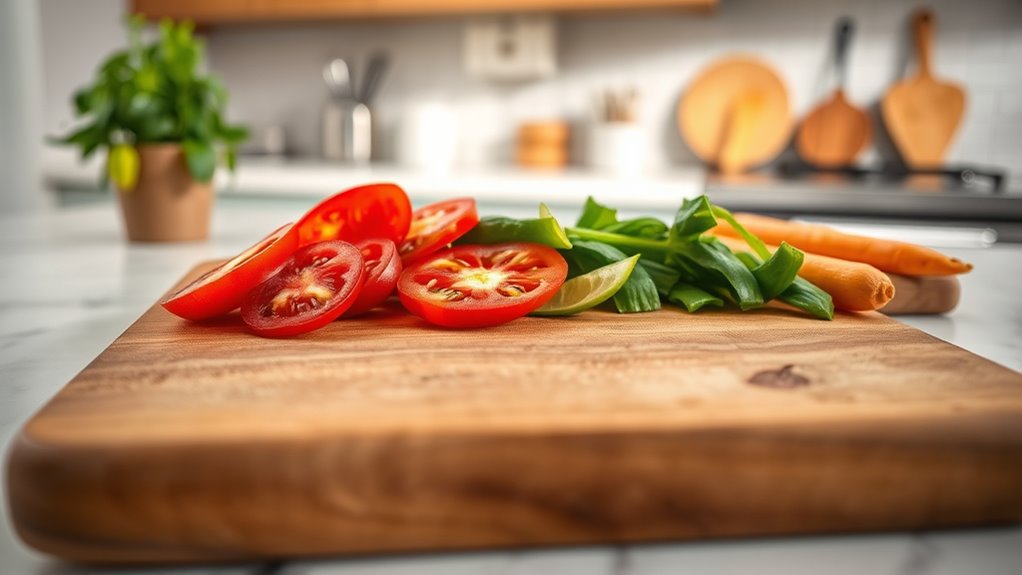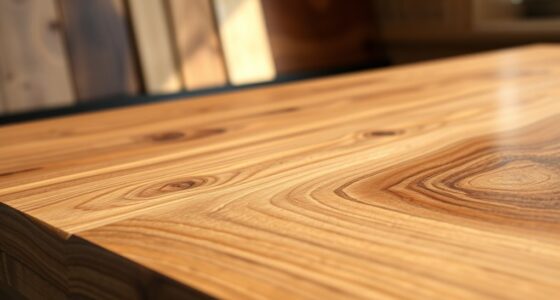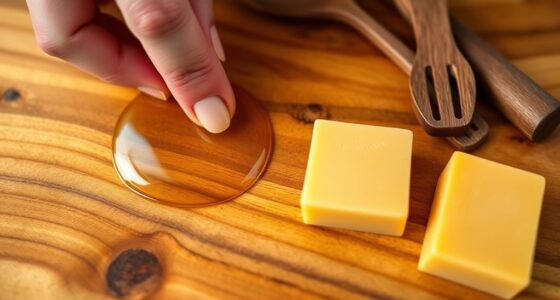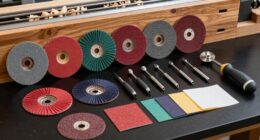Wooden kitchenware is generally safe for food preparation since it has natural antimicrobial properties that inhibit bacterial growth and a porous surface that dries quickly. If you regularly clean, air dry, and inspect your utensils for cracks or damage, they can be both hygienic and durable. Choosing the right, food-safe wood and following proper care tips further guarantee safety. To learn more about maintaining your wooden tools and their health benefits, keep exploring the essential tips for safe kitchen practices.
Key Takeaways
- Wooden kitchenware contains natural antimicrobial properties that inhibit bacterial growth, making it safe for food contact.
- Proper cleaning, air drying, and regular inspection prevent bacterial buildup and maintain hygiene.
- Woods like maple, cherry, and olive are dense and resist absorption, enhancing safety during food preparation.
- Avoid soaking or dishwashing to prevent warping and surface damage, ensuring continued safety.
- Replacing damaged or worn items prevents contamination and promotes a hygienic cooking environment.

Mooues 9 Piece Natural Teak Wooden Kitchen Utensil Set with Spoon Rest – Comfort Grip Cooking Spoons and Utensils Holder
Wooden Spoon Holder & Spoon Rest: In contrast with others, our wood spoons comes with a spoon rest…
As an affiliate, we earn on qualifying purchases.
As an affiliate, we earn on qualifying purchases.
Understanding the Safety Benefits of Wooden Kitchenware
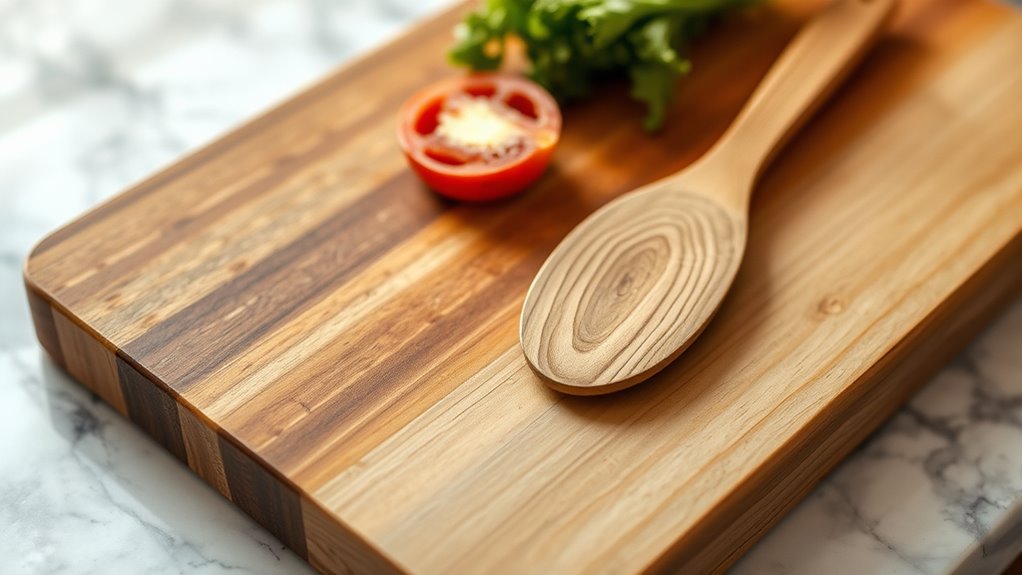
Understanding the safety benefits of wooden kitchenware reveals why it’s a popular choice for many home cooks. Wooden utensils naturally contain antimicrobial properties that inhibit bacterial growth, supporting food safety and healthy cooking. When properly cared for, they resist bacteria better than plastic, especially when you air dry completely after washing with hot water and soap. The porous structure of wood doesn’t harbor persistent bacteria if you maintain good air flow during drying. Studies show bacteria that penetrate wood tend to die within hours, reducing cross-contamination risks. Long-term use of well-maintained wooden utensils remains safe, making them a reliable, natural option. Proper care—like cleaning thoroughly and allowing air dry completely—ensures your wooden kitchenware stays hygienic and safe for everyday food preparation. Additionally, maintaining proper air circulation during drying helps prevent bacterial buildup and prolongs the lifespan of your utensils. Regularly inspecting and maintaining your wooden tools ensures they stay in optimal condition and safe for use. Moreover, choosing high-quality wood can further enhance the antimicrobial benefits and durability of your kitchenware. Using appropriate cleaning techniques can further ensure your wooden utensils remain safe and in good condition over time.
A well-designed ventilation system can also aid in faster drying and bacterial control, supporting overall kitchen hygiene.
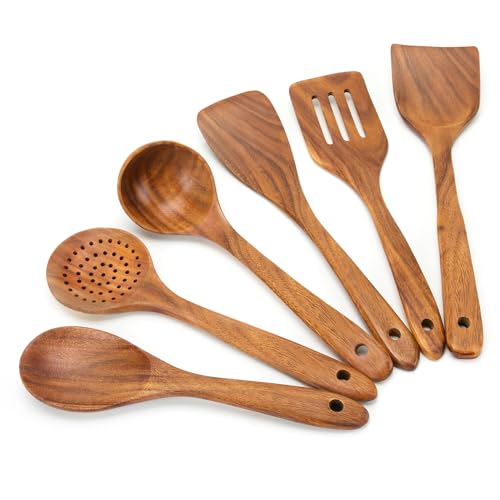
EZuncle 6 Piece Wooden Cooking Spoon Set – Ideal For Non-Stick Pans, Heat Resistant Solid Wood, Smooth Teak Cutlery For a Comfortable grip – Lightweight and Durable – Easy to Clean(6 PCS Large)
NATURAL TEAK: Our wooden cooking utensils set is made of natural solid teak wood, which is healthy and…
As an affiliate, we earn on qualifying purchases.
As an affiliate, we earn on qualifying purchases.
The Antimicrobial and Porous Nature of Wood
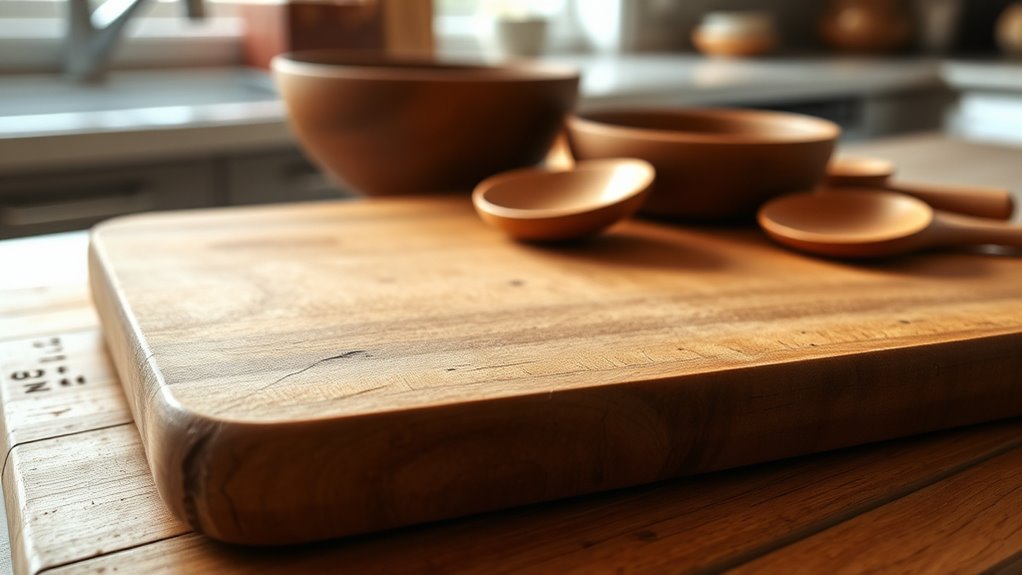
The porous structure of wood plays a crucial role in its natural antibacterial properties. Wooden utensils have a porous surface that allows water and bacteria to penetrate through capillary action, reducing surface bacteria growth. Some woods contain natural oils and antimicrobial compounds that inhibit bacteria, making them a hygienic choice for your kitchen. When bacteria embed in the pores, they tend to die within hours, decreasing the risk of contamination. Additionally, trendy options in wooden kitchenware often utilize sustainably sourced and eco-friendly materials, enhancing their appeal for environmentally conscious consumers. However, to maintain food safety, thorough drying after use is essential, preventing bacteria from thriving in the porous surface. Properly cared-for wooden utensils leverage their antimicrobial properties and porous structure, helping keep your kitchen clean and safe. When maintained correctly, these natural features make wood a reliable and safe material for food preparation.
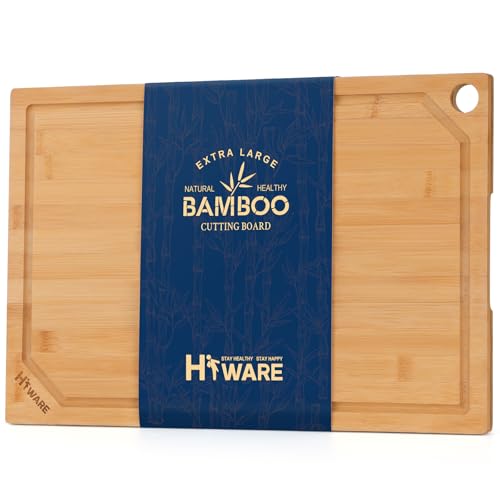
Hiware Extra Large Bamboo Cutting Board for Kitchen, Heavy Duty Wood Cutting Board with Juice Groove, 100% Organic Bamboo, Pre Oiled, 18" x 12"
100% Premium Natural Bamboo: This cutting board is crafted from sustainable bamboo, showcasing the natural grain and beauty…
As an affiliate, we earn on qualifying purchases.
As an affiliate, we earn on qualifying purchases.
Proper Cleaning and Maintenance Practices
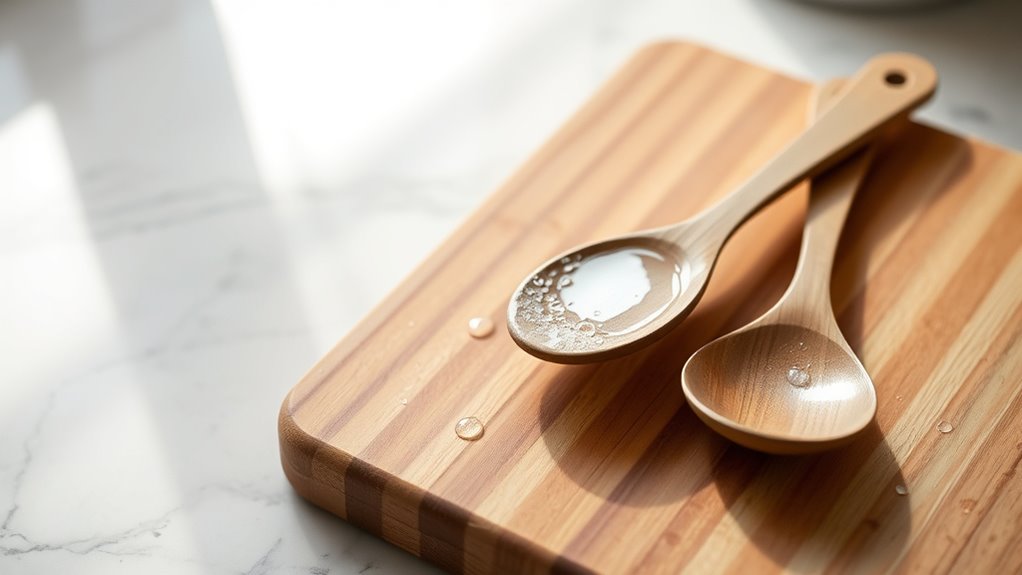
To keep your wooden kitchenware safe and effective, proper cleaning and maintenance are essential. After use, hand wash your wooden utensils with hot water and mild soap—avoid the dishwasher to prevent damage. Dry them thoroughly in a well-ventilated area for at least 24 hours to prevent bacterial growth and extend their lifespan. Regularly inspect for cracks or splits and replace if needed. Apply food-safe mineral oil periodically to maintain the wood’s integrity, making cleaning easier and preventing dehydration. Proper care also involves avoiding soaking in water or vinegar solutions, which can cause warping. Additionally, understanding the importance of aromatherapy oils can help you select the best maintenance practices to preserve the natural appearance of your wooden utensils. Incorporating performance tuning knowledge can further improve your maintenance routine by ensuring optimal conditions for your kitchenware’s longevity. Following these practices ensures food safety and maximizes your utensils’ warranty. Use the table below for quick reference:
| Cleaning & Maintenance Tip | Why It Matters |
|---|---|
| Hand wash with soap & water | Prevents damage and bacterial growth |
| Thoroughly dry | Stops bacteria and prolongs life |
| Apply mineral oil | Maintains wood and food safety |
| Regular inspection | Ensures safe, proper care |

Kitchen Utenails Set with Holder,Kitchen Wooden Utensils for Cooking, Wood Utensil Natural Teak Wood Spoons for Cooking,Wooden Kitchen Utensil Set With Spatula and Ladle (11)
Kitchen Utensils with Holder: An ideal Wooden Kitchen Utensil Set that features all the essential cooking tools including…
As an affiliate, we earn on qualifying purchases.
As an affiliate, we earn on qualifying purchases.
Choosing the Right Food-Safe Woods for Utensils
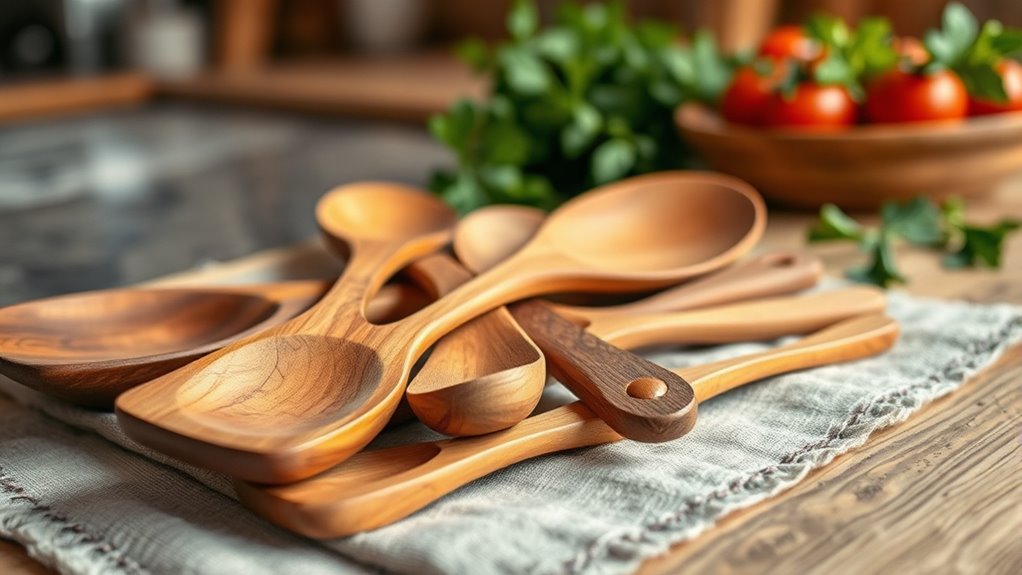
Choosing the right food-safe woods for your utensils guarantees both safety and durability. Opt for woods like maple, cherry, walnut, beech, or olive, as they are recognized for their natural antimicrobial properties and non-toxic nature. Dense grain woods are ideal because they’re resistant to absorption of liquids and odors when properly maintained, reducing bacterial growth. Selecting sustainable sourcing ensures you’re using environmentally friendly materials free from chemical treatments that could jeopardize safety. Durable wooden utensils made from these woods withstand regular use and proper maintenance, such as hand washing and oiling, which prolongs their hygienic qualities. Additionally, selecting woods with natural antimicrobial properties can help prevent bacterial buildup on your kitchen tools. Proper maintenance and care of wooden utensils further enhance their safety and longevity. Using food-safe woods not only promotes a healthier kitchen environment but also contributes to eco-friendly practices that support sustainable forestry. Incorporating advanced automation technologies in manufacturing can also improve the consistency and safety of wooden kitchenware. For example, selecting woods with resistance to liquids and odors ensures longevity and reduces the need for replacement, making your utensils more sustainable over time. Prioritizing food-safe woods helps you create safe, reliable, and eco-conscious kitchen tools that resist bacterial contamination and last over time.
Common Mistakes That Can Compromise Safety
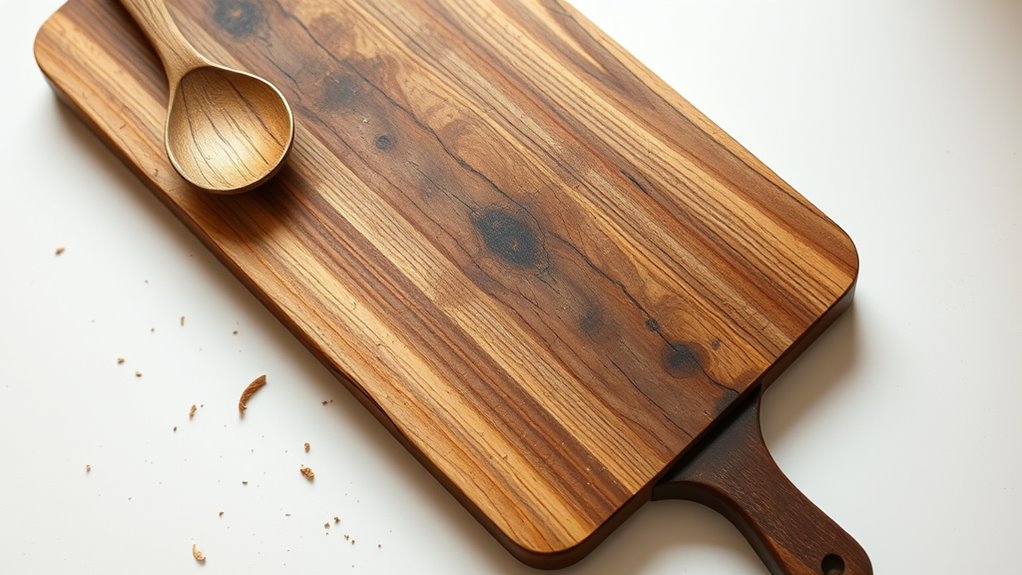
Many common mistakes can undermine the safety of your wooden kitchenware. Failing to dry your utensils properly after washing leaves moisture retention that promotes bacterial growth, risking food safety. Soaking wooden spoons in water for too long weakens the wood and can cause cracks or splits, which provide hiding spots for bacteria. Using harsh cleaning agents or placing wooden items in the dishwasher damages the surface, creating crevices where bacteria can thrive. Neglecting regular wooden utensil maintenance, like inspecting for cracks, increases contamination risk. Additionally, storing wooden ware in damp or poorly ventilated conditions prevents proper drying, leading to bacterial buildup. To ensure food safety, always practice good wooden spoon care, maintain clean storage conditions, and avoid harsh cleaning methods that compromise the integrity of your utensils.
Signs That Indicate It’s Time to Replace Wooden Items

Over time, even well-maintained wooden utensils can show signs that it’s time to replace them. Cracks and splinters are major indicators, as they can harbor bacteria and make cleaning difficult. Excessive wear, such as grooves or thinning, compromises their strength and safety. If your wooden spoon or board refuses to dry completely after cleaning, internal damage may be present, increasing the risk of bacteria growth. Persistent odors that won’t go away also suggest bacteria or mold buildup, signaling it’s time to discard. Additionally, warping or discoloration point to deterioration or contamination. Damage like this not only affects the utensil’s performance but also poses food safety risks. Regularly inspecting your wooden kitchenware helps prevent bacterial contamination and ensures your utensils remain safe to use. Using proper cleaning techniques and drying thoroughly can extend the lifespan of wooden items. Incorporating quality wooden cookware into your kitchen can also reduce the likelihood of damage and contamination. Proper maintenance practices and ensuring adequate airflow are essential to prevent moisture buildup, which can accelerate deterioration. Replacing worn or damaged wooden items helps ensure your kitchen remains safe and hygienic.
Environmental and Health Advantages of Using Wooden Kitchen Tools
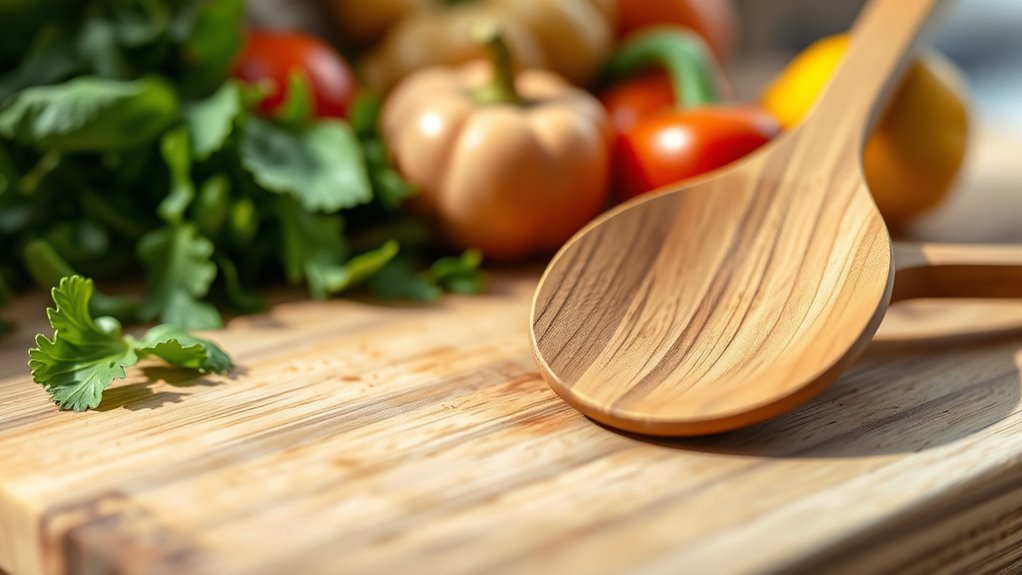
Using wooden kitchen tools offers notable environmental and health benefits that make them a smart choice for your home. Wooden utensils naturally possess antimicrobial properties that inhibit bacterial growth, enhancing food safety. Unlike plastics, wood doesn’t leach harmful chemicals into your food when used properly, supporting healthier cooking practices. Wooden tools create non-stick surfaces, reducing the need for excessive oils or non-stick coatings. Made from renewable resources like maple, cherry, or olive wood, they promote environmentally friendly and sustainable cooking. With proper cleaning and maintenance, wooden utensils remain hygienic and durable. Choosing wood over single-use plastics or metal utensils also minimizes waste and reliance on non-renewable materials. Additionally, wood’s biodegradability ensures that it breaks down naturally at the end of its lifespan, further reducing environmental impact. Incorporating sustainable materials into your kitchenware supports eco-conscious living and reduces your carbon footprint. Using wooden kitchenware also encourages the use of regional resources, which can decrease transportation emissions and support local economies. Furthermore, selecting energy-efficient appliances for your kitchen can complement your eco-friendly efforts by reducing overall power consumption. Engaging in proper maintenance practices can extend the lifespan of wooden utensils and keep them in optimal condition. Overall, wooden kitchenware combines safety, eco-friendliness, and functionality for a healthier, more sustainable kitchen.
Frequently Asked Questions
Is It Safe to Eat With Wooden Utensils?
You can eat with wooden utensils safely, as they’re naturally antimicrobial and inhibit bacterial growth. When you clean them with hot water and soap, then air dry thoroughly, you maintain their hygiene. Unlike plastics, wood reduces the risk of cross-contamination. Just avoid dishwasher use and regularly maintain your utensils to keep them bacteria-resistant. This way, you can enjoy your food confidently, knowing your wooden utensils are safe for everyday use.
Are Wooden Kitchen Utensils Sanitary?
Your wooden kitchen utensils are more sanitary than you might think—like a fortress against bacteria. Their natural antimicrobial properties inhibit growth, and bacteria that do get in tend to die quickly. Just remember to clean them with hot water and soap, air dry thoroughly, and avoid soaking or dishwasher use. With proper care, your wooden utensils stay safe and hygienic, making them a reliable choice for food prep.
Why Is Wood Not Used for Making Cooking Utensils?
You might wonder why wood isn’t more commonly used for making cooking utensils. Wood can crack or split over time, especially with frequent use or dishwasher cleaning, which compromises durability. Its porous nature allows liquids and bacteria to seep in if not properly cleaned and dried, risking hygiene. Additionally, certain woods may stain or retain odors, affecting the utensil’s appearance and taste of your food.
Do Wooden Utensils Leach Chemicals?
You might wonder if wooden utensils leach chemicals, but the truth is, they generally don’t. When crafted and maintained properly, wood doesn’t release harmful substances into your food. It’s free from BPA and other chemicals found in plastics. Just remember to clean and dry your utensils well, and use food-safe oils. With proper care, wooden utensils stay safe and inert, making them a reliable choice for food prep.
Is It Safe to Cook Raw Meat With Wooden Utensils?
Imagine a knight’s sword, polished and well-maintained—that’s how your wooden utensils should be. You can safely cook raw meat with them if you clean and dry the utensils properly afterward. Bacteria may penetrate the wood’s surface but usually die within hours. Regular sanitizing with hot water, soap, and proper maintenance prevent harmful bacteria, making wooden utensils a safe choice for handling raw meat.
Conclusion
While wooden kitchenware offers many subtle benefits, paying attention to proper care guarantees your culinary journey remains smooth. By respecting its gentle nature and nurturing it with mindful maintenance, you help preserve its quiet virtues. When signs of wear appear, gently consider renewal or replacement, allowing your kitchen’s harmony to continue undisturbed. Embracing these simple practices lets you enjoy the timeless charm of wooden tools, subtly enriching every meal with safety and sustainability.
